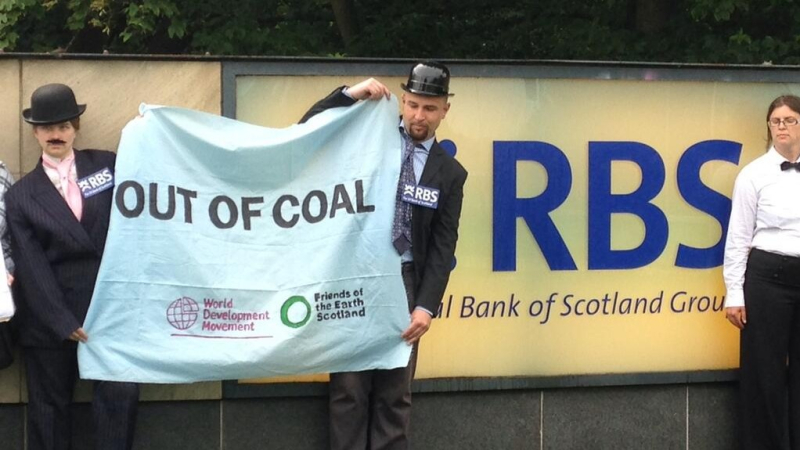RBS moves on coal and tar sands and takes the lead of UK banks

RBS announced yesterday that it will stop financing new coal projects worldwide, as well as exploration and extraction projects in the tar sands sector. The bank will also stop lending to coal companies deriving more than 40% of their revenues from thermal coal or generating more than 40% of their electricity from coal .
Reacting to the updated RBS policies, Yann Louvel, climate campaigner of the commercial bank watchdog organisation BankTrack, said:
"It is good to see RBS finally adopt such exclusions for the coal sector and taking the lead among UK banks on coal. RBS is the first UK bank to adopt a full worldwide ban for the direct financing of new coal plants, contrary to HSBC which adopted in its updated policy last month exceptions for Vietnam, Indonesia and Bangladesh, three key coal growth countries, until 2023 . RBS is also the first bank in the UK to adopt a 40% threshold to exclude lending to some coal companies since no other UK bank has any exclusion threshold for coal utilities”.
“RBS could have gone further and adopt the 30% exclusion threshold used in the Global Coal Exit List for corporate finance, which many big investors have adopted so far such as Allianz or AXA . It is also worrying to see the new updated policies only apply to general lending to companies because most of big banks’ sector policies also cover underwriting deals since much of the financing to coal companies is raised through the issuance of new shares and bonds.”
“RBS has nonetheless far outstripped other UK banks in terms of coal exclusions. HSBC must now close its policy loophole and adopt a similar exclusion to stop financing new coal plants anywhere in the world. As the next UK bank to update its policy soon, Standard Chartered must also adopt such an exclusion with no exception and join the 16 international banks which have already done so, including now RBS . To answer the climate urgency and the health crisis linked to coal power, HSBC and Standard Chartered must also withdraw from their current involvement in six coal power dodgy deals in Vietnam and Indonesia”.
The RBS announcement captures in formal policy the decreasing trend observed in the bank financing figures to top coal companies published in the last Fossil Fuel Finance Report Card earlier this year, which went from $504 million in 2015 to $172 million in 2016, and $0 in 2017 .
RBS also announced the end of its project financing to tar sands projects - but only for exploration and extraction projects, leaving out pipelines. This puts them on par with UK bank Standard Chartered, as well as Spanish bank BBVA and Dutch bank ABN Amro, but lagging behind seven other European banks that have adopted policies excluding direct financing for all tar sands projects .
BankTrack considers this broader exclusion of all tar sands dedicated financing as a bare minimum to adopt for banks, with exclusion of corporate finance for tar sands production and pipeline companies as a more ambitious but necessary further step. Given that RBS gave no money to top tar sands companies in 2017, it should now take its policy even further to make clear to its customers that it is serious about its commitment to being a leader in sustainable financing, and to be an example of best practice in this area to other banks.
Notes for editors:
See RBS announcement on this page.
See BankTrack reaction to HSBC new coal policy on this page.
See the Global Coal Exit List on this page, Allianz announcement on this page and AXA announcement on this page.
See BankTrack’s page listing banks that ended direct finance for coal projects worldwide here.
See the 'Banking on Climate Change 2018' report on this page.
See BankTrack’s page listing banks that ended direct finance for tar sands projects here.
